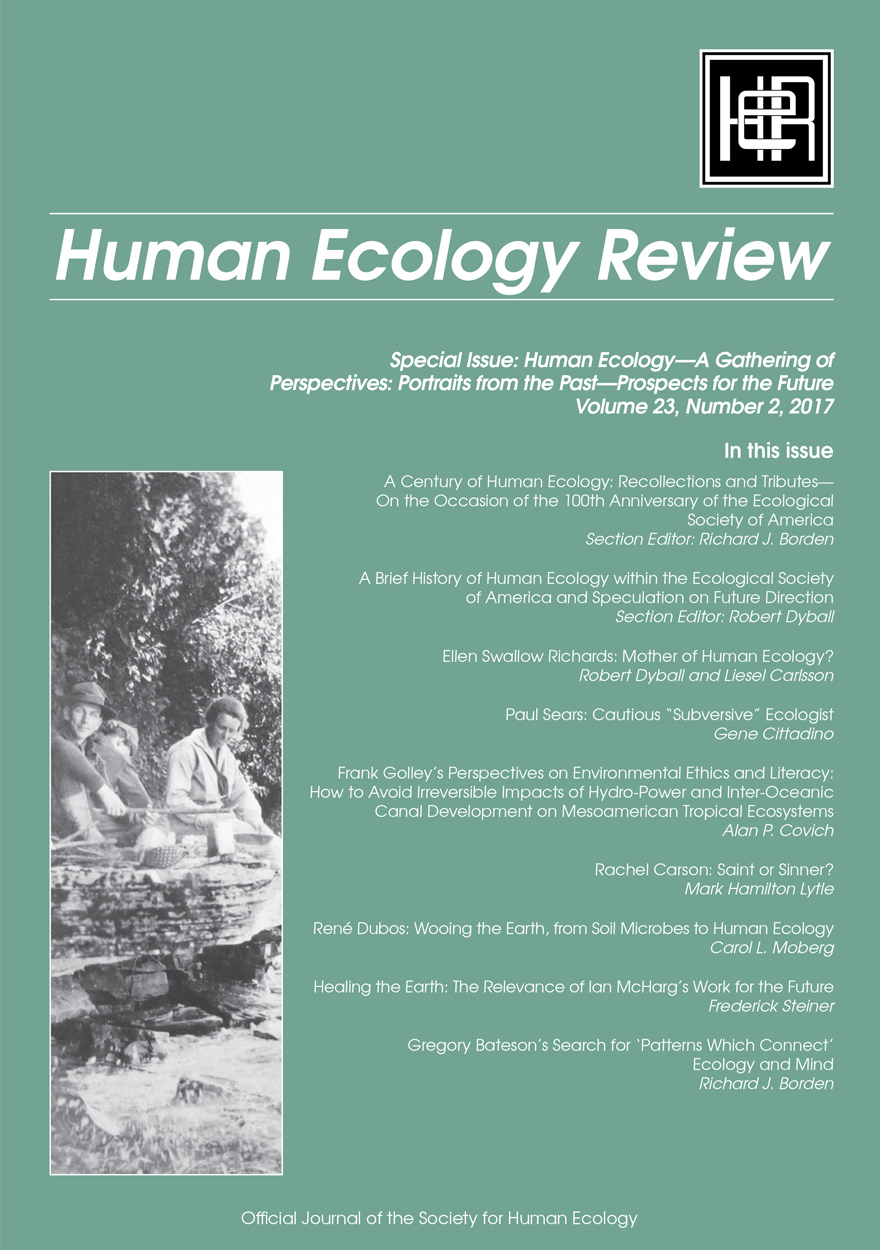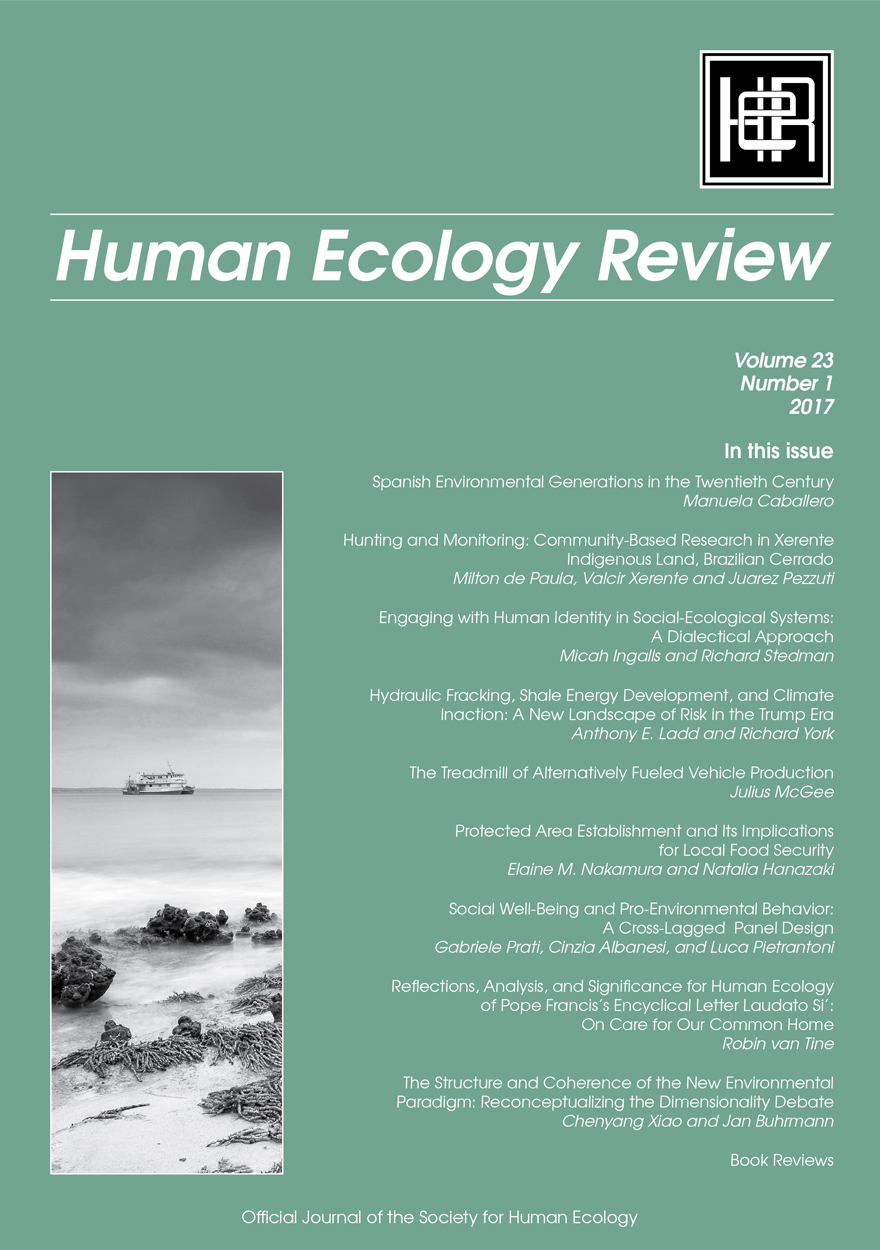Search titles
Displaying results 141 to 150 of 376.

East Asia Forum Quarterly: Volume 9, Number 4, 2017 »
Publication date: December 2017
East Asia Forum Quarterly grew out of East Asia Forum (EAF) online, which has developed a reputation for providing a platform for the best in Asian analysis, research and policy comment on the Asia Pacific region in world affairs. EAFQ aims to provide a further window onto research in the leading research institutes in Asia and to provide expert comment on current developments within the region. The East Asia Forum Quarterly, like East Asia Forum online, is an initiative of the East Asia Forum (EAF) and its host organisation, the East Asian Bureau of Economic Research (EABER) in the Crawford School of Economics and Government in the College of Asia & the Pacific at The Australian National University.
Download for free
Not available for purchase

Human Ecology Review: Volume 23, Number 2 »
Special Issue: Human Ecology—A Gathering of Perspectives: Portraits from the Past—Prospects for the Future
Publication date: December 2017
Human Ecology Review is a semi-annual journal that publishes peer-reviewed interdisciplinary research on all aspects of human–environment interactions (Research in Human Ecology). The journal also publishes essays, discussion papers, dialogue, and commentary on special topics relevant to human ecology (Human Ecology Forum), book reviews (Contemporary Human Ecology), and letters, announcements, and other items of interest (Human Ecology Bulletin). Human Ecology Review also publishes an occasional paper series in the Philosophy of Human Ecology and Social–Environmental Sustainability.
Download for free
Not available for purchase

Multi-level Governance »
Conceptual challenges and case studies from Australia
Edited by: Katherine A. Daniell, Adrian Kay
Publication date: November 2017
Important policy problems rarely fit neatly within existing territorial boundaries. More difficult still, individual governments or government departments rarely enjoy the power, resources and governance structures required to respond effectively to policy challenges under their responsibility. These dilemmas impose the requirement to work with others from the public, private, non-governmental organisation (NGO) or community spheres, and across a range of administrative levels and sectors. But how? This book investigates the challenges—both conceptual and practical—of multi-level governance processes. It draws on a range of cases from Australian public policy, with comparisons to multi-level governance systems abroad, to understand factors behind the effective coordination and management of multi-level governance processes in different policy areas over the short and longer term. Issues such as accountability, politics and cultures of governance are investigated through policy areas including social, environmental and spatial planning policy.
The authors of the volume are a range of academics and past public servants from different jurisdictions, which allows previously hidden stories and processes of multi-level governance in Australia across different periods of government to be revealed and analysed for the first time.

War and Other Means »
Power and violence in Houaïlou (New Caledonia)
Authored by: Michel Naepels
Publication date: October 2017
War and Other Means describes and analyses the practices of war, the ‘objects of war’ and the conventions of the use of violence in Houaïlou, New Caledonia. It focuses on the colonial repression conducted in 1856 and after, the anti-sorcerer hunt in 1955, the independence mobilisation in the 1980s and the village feuds in the 2000s. Through this archaeology of violence, it reports on the practical inventiveness, intelligence and cunning of the Kanaks involved in social, often violent, conflicts. The use of archival material and recourse to the oral stories gathered from the inhabitants of Houaïlou restores the depth of these historical moments and the nested contexts of the political action that unfolded; it also questions the value and limits of fieldwork investigation.
These episodes are moments of change in the social, administrative, land and political organisation of New Caledonia; they make it possible to understand, from France’s takeover to the present day, the real modalities of implementation of colonial and postcolonial governmentality. The attention given to the invention, the importation or the adaptation of repressive techniques, closely linked to the French experience in Algeria, opens up a geopolitics of colonisation. Through this detailed description of the social logics of conflict, Michel Naepels also invites us to reflect on the place of European fantasies on violence and on the representations of otherness.
For the French edition, Conjurer la guerre. Violence et pouvoir à Houaïlou (Nouvelle-Calédonie), published by Éditions de l’École des hautes études en sciences sociales, please visit editions.ehess.fr/ouvrages/ouvrage/conjurer-la-guerre

Sin Descansar, En Mi Memoria »
La lucha por la Creación de sitios de memoria en Chile desde la transición a la democracia
Authored by: Peter Read, Marivic Wyndham
Publication date: October 2017
En el once de septiembre de 1973, el Jefe de las Fuerzas Armadas de Chile, Augusto Pinochet, derrocó al gobierno del Partido de la Unidad Popular de Salvador Allende e instaló una dictadura militar. Sin embargo, este no es un libro de partidos e ideologías políticas, pero una historia pública. Se enfoca en los memoriales y conmemoraciones en siete sitios de tortura, exterminio y desaparición en Santiago de Chile. Se entablan debates universales del por qué y cómo los actos de violencia infligidos por un Estado contra sus propios ciudadanos deben ser recordados, y por quiénes.
Los sitios investigados – incluso el nefasto caso del Estadio Nacional – son entre los más simbólicos de más de mil de tales sitios por todo el país.
Este estudio vislumbra la profundidad de los sentimientos que los sobrevivientes y las familias de los detenidos desaparecidos y los ejecutados políticos arrastran en cada uno de estos sitios. Este libro sigue sus luchas para conmemorar a cada uno, y así revela lentamente sus sentimientos: su idealismo, esperanza, coraje, frustración, odio, emoción, resentimiento, tristeza, división y desilusión.

Made in China Journal: Volume 2, Issue 3, 2017 »
Edited by: Ivan Franceschini, Nicholas Loubere
Publication date: September 2017
In today’s globalised and interconnected world, Chinese labour issues have become much more than merely a local matter. With China’s political and economic power increasing by the day, it is imperative not only to assess how this growing influence affects labour relations in other countries, but also to abandon an ‘exceptional’ view of China by engaging in more comparative research. In this sense, the study of Chinese labour indeed provides a powerful lens—or perhaps a mirror—to further our understanding of the contemporary world and our potential futures. With this aim in mind, in this issue we publish a series of essays that either frame Chinese labour comparatively or examine its transnational implications.
Download for free
Not available for purchase

East Asia Forum Quarterly: Volume 9, Number 3, 2017 »
Publication date: September 2017
East Asia Forum Quarterly grew out of East Asia Forum (EAF) online, which has developed a reputation for providing a platform for the best in Asian analysis, research and policy comment on the Asia Pacific region in world affairs. EAFQ aims to provide a further window onto research in the leading research institutes in Asia and to provide expert comment on current developments within the region. The East Asia Forum Quarterly, like East Asia Forum online, is an initiative of the East Asia Forum (EAF) and its host organisation, the East Asian Bureau of Economic Research (EABER) in the Crawford School of Economics and Government in the College of Asia & the Pacific at The Australian National University.
Download for free
Not available for purchase

Learning from Fukushima »
Nuclear power in East Asia
Edited by: Peter Van Ness, Mel Gurtov
Publication date: September 2017
Learning from Fukushima began as a project to respond in a helpful way to the March 2011 triple disaster (earthquake, tsunami, and nuclear meltdown) in north-eastern Japan. It evolved into a collaborative and comprehensive investigation of whether nuclear power was a realistic energy option for East Asia, especially for the 10 member-countries of ASEAN, none of which currently has an operational nuclear power plant. We address all the questions that a country must ask in considering the possibility of nuclear power, including cost of construction, staffing, regulation and liability, decommissioning, disposal of nuclear waste, and the impact on climate change. The authors are physicists, engineers, biologists, a public health physician, and international relations specialists. Each author presents the results of their work.
The Japanese translation of this book is available for purchase on the Ronso website.

Human Ecology Review: Volume 23, Number 1 »
Publication date: September 2017
Human Ecology Review is a semi-annual journal that publishes peer-reviewed interdisciplinary research on all aspects of human–environment interactions (Research in Human Ecology). The journal also publishes essays, discussion papers, dialogue, and commentary on special topics relevant to human ecology (Human Ecology Forum), book reviews (Contemporary Human Ecology), and letters, announcements, and other items of interest (Human Ecology Bulletin). Human Ecology Review also publishes an occasional paper series in the Philosophy of Human Ecology and Social–Environmental Sustainability.
Download for free
Not available for purchase

The General’s Goose »
Fiji's Tale of Contemporary Misadventure
Authored by: Robbie Robertson
Publication date: August 2017
His admirers said he was a charismatic leader with a dazzling smile, a commoner following an ancient tradition of warrior service on behalf of an indigenous people who feared marginalisation at the hands of ungrateful immigrants. One tourist pleaded with him to stage a coup in her backyard; in private parties around the capital, Suva, infatuated women whispered ‘coup me baby’ in his presence. It was so easy to overlook the enormity of what he had done in planning and implementing Fiji’s first military coup, to be seduced by celebrity, captivated by the excitement of the moment, and plead its inevitability as the final eruption of long-simmering indigenous discontent. A generation would pass before the consequences of the actions of Fiji’s strongman of 1987, Sitiveni Rabuka, would be fully appreciated but, by then, the die had been well and truly cast. The major general did not live happily ever after. No nirvana followed the assertion of indigenous rights. If anything, misadventure became his country’s most enduring contemporary trait. This is Fiji’s very human story.



